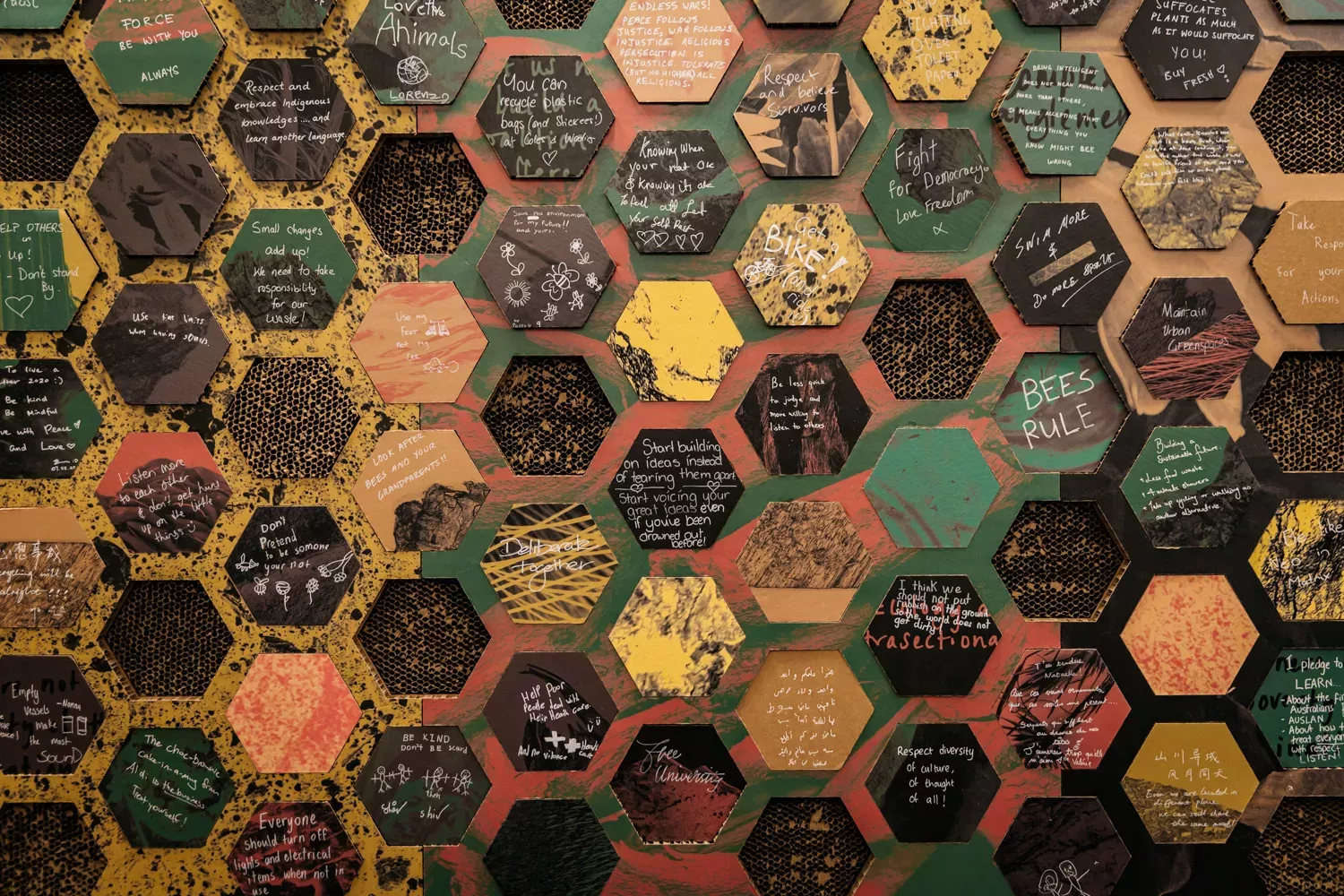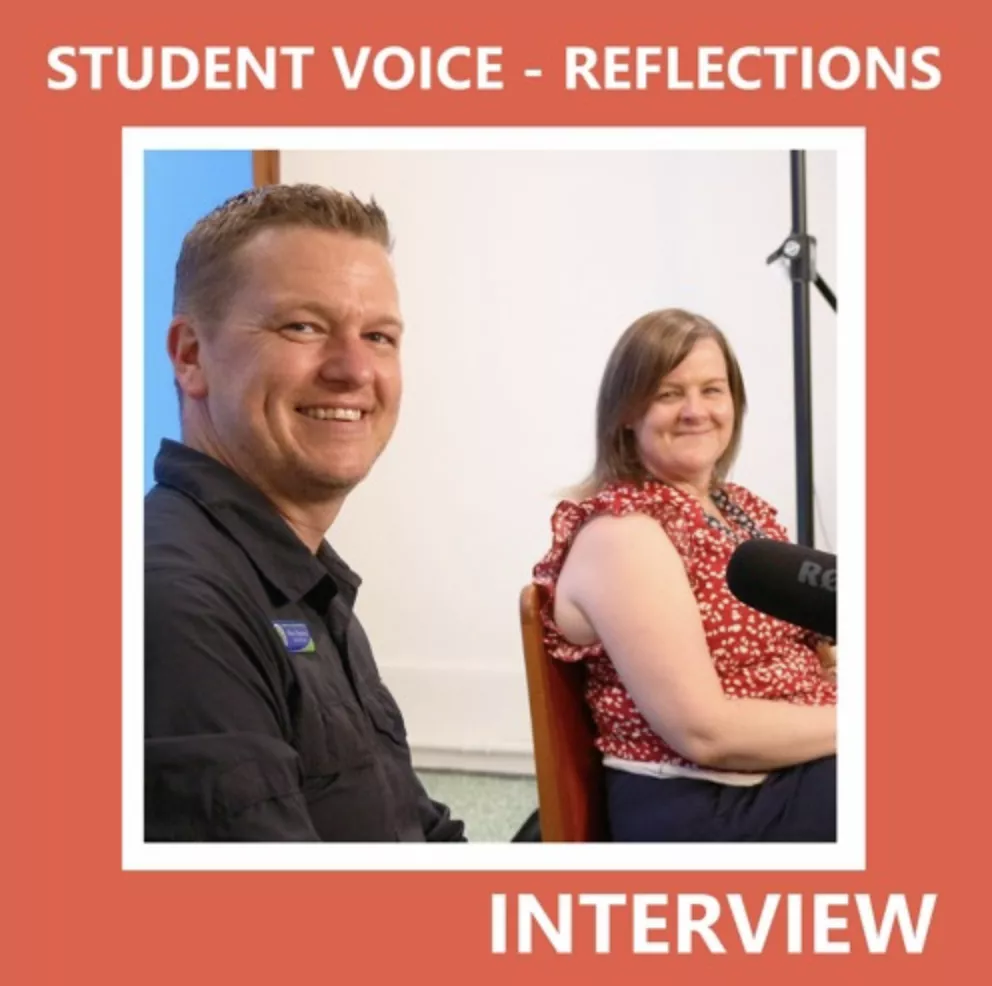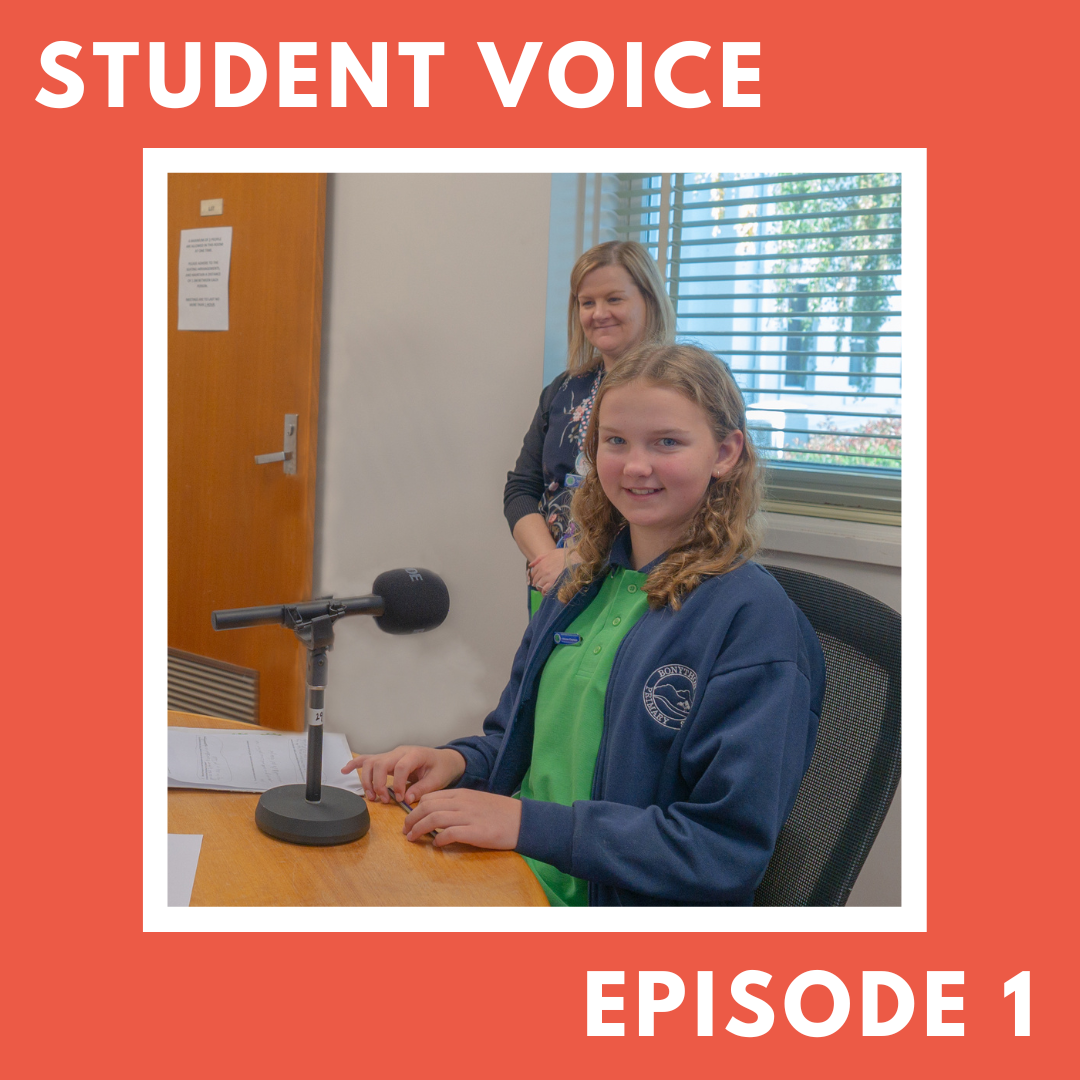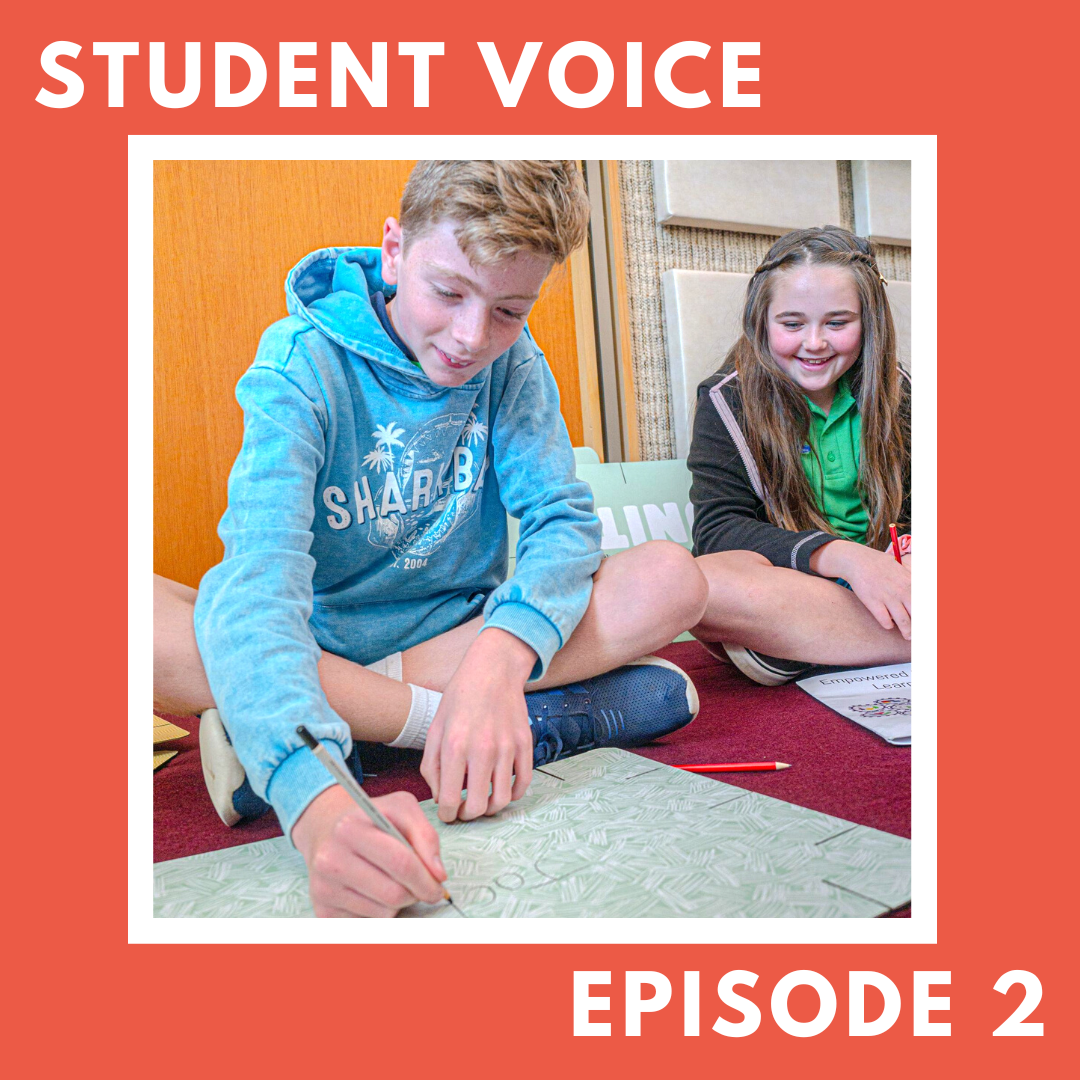

Student voice – empowered leaders
Educators reflect on how they've empowered students to become leaders.
Educators Marc and Marissa from Bonython Primary School reflect on a year of running of the Empowered Student Leaders Initiative. We also hear from students about their experiences and reflections and ask what advice they have for the next student leaders.

Student Voice - Episode 5
0:00
[Music playing]
Stephanie Smith: Hello and welcome to another Museum of Australian Democracy podcast episode. My name is Stephanie Smith and I'm the manager of Learning here at MoAD. Today we are joined again by Marc and Marissa from Bonython Primary School to talk about our experiences and reflections from a year of running the Empowered Student Leaders Initiative. So, welcome Marc and Marissa.
Marc: Thanks, Steph. Hi everybody.
Marissa: Hi everyone. Thank you, Steph.
Stephanie: It's so fantastic to have you here with us today, and we are going to be reflecting on our fantastic partnership and the Empowered Student Leaders Initiative that we've been running over the past year. So, I look forward to hearing your reflections, your insights into the experience that we've had across 2021, and where we're going to take this leadership program in 2022.
I'd like to throw to you first, Marc, can you talk us through the thinking behind this initiative and where the idea of Empowered Student Leaders came from?
Marc: Yeah, thanks Steph. We're very big at Bonython about cultivating curiosity for learning, that is our stance. And we really wanted to amplify the opportunity for student voice and choice and agency. And we know that they're buzz words, but we thought [that] we want to really be serious about how do we provide some really authentic opportunities for, in this case, our senior students to lead.
So, we had some data over the number of years that kids were telling us more and more and more that they wanted a say in what they learnt and how they learn. So, we did some work behind the scenes, as you do in schools, to start to put together some ideas for an initiative to position senior students as leaders in the school.
What that has resulted in is an incredible partnership that we have with MoAD, and we're very fortunate for that, because we wouldn't be able to do this work without the partnership. But, that's a learning too, reach out and see what's available and use the resources that are around you and available to you.
So, we've worked really hard to reframe the idea of house groups in our school, too. So, we don't have a student representative council, we stopped that, and we really wanted to amplify the house group notion, but beyond sporting events, beyond carnivals, beyond you know, that's all important, but we wanted to stretch that, so we've aligned that to the way that we frame our conceptual curriculum around the big ideas that we learn about the world.
And it's been a really engaging process to bring the whole school on board now and we're looking forward to looking forward to where it's going to go beyond today.
Stephanie: Excellent, thank you for sharing that bit of background there. Marissa, can I throw to you and let's talk about the first event that we ran, the Empowered Student Leaders Conference at the beginning of the year and why that was so significant to this process.
Marissa: So, we really wanted to tune in really effectively for all of our [year] 5, 6 students around what is leadership. And as Marc spoke about we really wanted to take it beyond the area of sport. So we looked at leaders in our community who we could connect with in different areas. So in the science and technology world, in the arts world, we connected with you also here at MoAD, to really broaden the students idea of what is leadership and what could it look like. Because they had a very fixed view of what it could look like.
So, the Conference was our big tuning in session. We deliberately set it up like a conference, so we had a keynote speaker, who was one of our connections through our house groups, we went into breakout groups. And then our amazing art teacher brought it all together and the students were able to demonstrate what they had learnt in a visual kind of way that we were then able to refer back to throughout the year.
[Music playing]
Stephanie: So, this process involved all of the stage 3, or year 5, 6 students, and determined whether being part of the Empowered Student Leaders program was going to be for them. And then it involved the students voting for those leaders, Marc?
Marc: Students could make that choice if they wanted to put themself forward for possible election for house captain. And we were really mindful too, like our school isn't just led by one person, it's led by a team. And so we adopted that thinking for the house groups. So we wanted a team of captains for each house group.
So we ended up actually having 20 students elected through a process, they put themselves forward, they drafted their speeches to their house groups, they delivered those speeches. Like what lots of schools would do. We've got some ideas about how we want to stretch that for next year. Then from that, students from kindergarten to year 6 had the opportunity then within their house groups to elect their leadership team. Which then resulted in 20 year 5 and 6 students, so we offered it to both of those year groups, and we had a mix of students in year 5 and year 6 who were elected.
And then we ramped up, I guess, a year-long inquiry for them in terms of what makes an effective leader, what are the skills, the strategies, the dispositions that leaders need to be effective. And we've learnt this through MoAD too, the importance of being networked and connected.
So, we boldly reached out to other leaders within our local community, and you know, they all said yes. The people that we approached, they were more than happy [to participate], so then we had a series of different workshops. We had people coming and talking around the qualities of leaders in terms of being vulnerable and the importance of trust.
Our senior students identified that when they were in their house groups, it's pretty daunting when you're having to stand up and to talk to 100 other students. So, we enquired into different communication skills and we had a local media personality actually come and join us and run a session and then we topped it off with an awesome session with you, Steph, with a green screen and practising how do you deliver a message effectively to people to try and influence and bring them on board.
[Music playing]
Stephanie: So, across the year we've done a variety of workshops, generally at least one per term, and in term one, for our listeners, we started out with that inquiry and really delving into leadership and what it meant to those empowered student leaders, the 20 that had been selected. And we ran that onsite, here at the Museum of Australian Democracy, and we brought in some of our leaders to talk to the students, we sat in the Chambers. It had, you know, a special sense to welcoming them to these new, important roles that they had taken on. And we started an inquiry into what it means to be a leader, especially within those house groups, and how they were going to bring other students from the school on board with them throughout the year.
This then translated into other workshops and Marissa, it would be really great to delve a tiny bit more into the power of student voice and how much these empowered student leaders contributed to the direction of our program throughout the year.
Marissa: Yeah, so, regular reflection with our leaders is highly, highly important, and also really gave us direction for where to next. You know, we're all about voice and choice, and we really wanted to take their voice into what happened next. So that's where the public speaking focus came from for our term 3 focus. And we also engaged in when they ran the house group sessions across the school there was regular reflection about, 'Well that didn't go so well', or 'That went really well, we need to adapt that for next time'.
And I think over time their reflections got more meaningful and more thoughtful as they really, really stepped up to the challenge of running house group sessions around our guides for the school. They became more practiced at engaging in those opportunities and reflecting and yeah, it's a really powerful part of what we've done. And we've got reflections now from the end of the year and that's going to affect where we go next year with where we focus.
Stephanie: Absolutely. So, in our final session that we recently ran in term 4, the students were all invited to reflect on their experience and record a piece of advice for the next group of students coming in, in 2022. And so we will play you some of their recordings, so that you're able to hear their authentic voice, which then gave us a lot of feedback and inspiration, I guess, for where we could take this program moving into next year.
[School playground noises]
Student: Identify 3 things that you've learnt this year as part of your role as house captain.
Student: Be confident and believe in yourself, don't be afraid to make mistakes, act with responsibility and respect.
Student: Be confident when public speaking, don't be afraid to ask for help, help others to succeed.
Student: How to speak to others in year 5, 6, how to make good plans and how to public speak.
Student: How to speak in public places properly, how to lead a big group of people and how to give good feedback.
Student: One, it's not always easy, 2, how to speak in public, 3, how to be a better leader.
Student: Two words I would describe about the role as house captain at Bonython is leadership and support.
Student: Number one, different and wondrous.
Student: Kind and empathetic.
Student: One, inspiring, 2, hardworking.
Student: What is one piece of advice you would give the house captains of 2022?
Student: Definitely not to give up and don't be afraid to make mistakes.
Student: Be courageous and believe in yourself.
Student: Be a kind leader, meaning listen to others advice.
Student: At times it can be tough, but you can pull through, especially using grit.
Student: One piece of advice for 2022 house captains, don't be afraid to ask for help.
[Music playing]
Stephanie: Marc and Marissa, I'm sure you will agree with me how powerful those reflections are from the students who participated in the initiative this year, and I think that they will really add something for the students next year to be able to hear from their peers. Marc, can you talk us through one of your biggest reflections from this year and what you would do differently with this initiative?
Marc: Yeah, I think that message that we hear all the time, 'Do something and start small'. We had no idea where this was really going to go, and we, I guess we couldn't be prouder of what we've achieved this year, but that then really excites us, okay well we did this this year, and so now what are the opportunities that are available for us next year? You know our challenge in schools is always time, but I think it depends on how you look at time and if you're really clear about your why and your purpose and you prioritise the things that are most important. And, you know, to us, voice and choice and agency in all learners in our school is key. So, we've chosen to make this a priority.
We have an amazing school and an amazing leadership team that's very supportive of all of this work, so we're very thankful to the team beyond us. We're incredibly thankful for the partnership that we have with MoAD. That would be advice to the schools, reach out, there are so many resources in your local community and then broader. And particularly, I mean we're blessed to be based in the ACT where we have so much available to us. My word of encouragement I guess for other schools is, if you've got an idea, play with it and then reach out and have a conversation with someone. Because somebody will say yes.
Stephanie: Absolutely. There was so much input from the local community and bringing in individuals who had specialised skills that could work with the students based out of their reflections, that it really showcased what was around us and how we could make these students feel special and to give them that expert knowledge that we wanted them to have through this process, so they were really empowered to support the rest of the school. Marissa, is there something that you would change moving into next year? Do you think there's a big key thing that we would do differently?
Marissa: Marc's already alluded to it, we've had some discussions around what it might look like the election process for our house captains for next year. So, talking about how we might shape that process a little bit more to link with our school values and really ramp up the leadership in that area and the quality in what we are expecting from our students.
We've asked a lot of our students this year and I think in reflection, if I think about it, the thing I'm most proud of is that we gave them opportunities and they thrived, they absolutely thrived. So I think it's learning for us in that we have to provide opportunities for students to be in these situations, to have these opportunities.
Stephanie: Marc, can you tell us a little bit about how your community has received this program and how parents have felt about the Empowered Student Leaders Initiative?
Marc: Feedback from the student leaders has been amazing, but we recently received some feedback from parents really taking the time to acknowledge the work that has happened and the opportunities and the experiences that have been put in place, particularly from our students that are moving onto high school next year. So, we've received some really positive [feedback], which is great that our community is behind it as well.
Stephanie: I think that it's so powerful having both year 5 and 6 as part of this group. And I think moving into next year, there is the potential that some of those year 5 students that were part of the initiative this year will be picked up again. And I think, for us, there's a great opportunity in there, given they spent a year working through this process and building up their leadership skills that we will have an opportunity to work closely with them and allow them to shine more in the conversation as they share their learnings and their experiences. You know, we really found that public speaking was such a big challenge for this group of students that we may have the opportunity to share the learnings as we move forward to really make that shine through earlier in our process.
I look forward to seeing what a new cohort of students brings to the table in 2022, because one of the absolute benefits of this initiative is that we can't use the same content twice and run the same program consecutive years in a row because we've got some of the same students feeding into the conversation. So, I think that offers such a rich opportunity for us to rethink what we're doing and how we can really build on this leadership program and tailor it to a new group of students.
Marc and Marissa, it has been an absolute pleasure being able to chat to you today, and I've thoroughly enjoyed the opportunity for MoAD Learning to connect with Bonython Primary School and to be able to work on this initiative together. So, thank you for coming into the studio today.
[Music playing]
Stephanie: Visit MoAD Learning to access more podcast recordings and activity sheets to support your students build their voice and agency in your classroom.
[Music playing]




